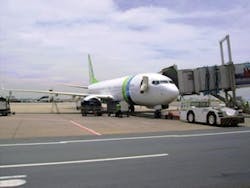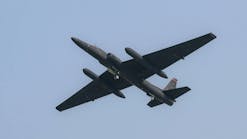The Hermetic philosophy of ‘as above, so below’ can be readily applied to the aviation industry. Because just as the airlines are moving ponderously toward consolidation, slowly demolishing outdated bilateral rules and ownership issues, the ground handling market too is witnessing a
coming together.
The same principles are driving both: economies of scale, global reach and growth potential among them. But to what extent the ground handling market will be united remains to be seen.
Swissport International Ltd., which is owned by Ferrovial and is active at 184 airports in 43 countries on five continents, believes consolidation will happen but doesn’t necessarily discount the future role of local enterprises. “We will see both developments in parallel,” says a spokesperson.
“External banks and merger and acquisition experts are predicting a consolidation on a global level of between three to four players maximum. Beside this you will find some regional providers covering their respective markets and, of course, we will always see hundreds of smaller, local players with their local expertise. The ground handling market was always highly fragmented.”
International spread
That fragmentation is eroding, however. Perhaps the best example of this is Dnata’s growing empire. Now almost 50 years old, Dnata has split into three business areas: Dnata Airport Operations, Dnata Cargo and Dnata Travel Services.
Dnata Airport Operations is obviously best known for its ground and passenger handling services at Dubai International Airport but has quietly expanded its international reach and now has services at 16 airports in seven countries — Singapore, Switzerland, Philippines, Australia, Pakistan, China and the United Arab Emirates.
The most recent acquisition is Jet Handling AG, the airport handling division of Swiss-based Jet Aviation Group. The agreement was signed in November 2007 and was the third deal of the year following joint ventures in Australia and China.
“We were attracted by Jet Aviation Handling’s reputation as a first-class, quality handling agent, one of the best in Europe,” explains Stewart Angus, divisional senior vice president, Associated Companies, Dnata. “It has an excellent management team, sets itself very high standards and has a strong customer base. As such, this fits in perfectly with our strategy of building a network of high-caliber operations in different countries.”
Jet Handling operates from Zurich and Geneva and its 60-strong client base includes British Airways, Emirates, Etihad and Air Berlin. More than 1,000 staff across the two airports offer a comprehensive package such as passenger services, communications, cargo and station control.
The sale means the group will now be able to concentrate on its core activities in the private and business aviation sector — the FBO operations are not part of the deal but rather will remain with the Jet Aviation Group.
Urs Zorn, senior vice president and general manager of Jet Aviation Handling AG, said in a statement, “Our management and the employees enjoy the full confidence of the new shareholder and Dnata is eager to work with the current management team. Within the next few months, we will change Jet Aviation Handling AG’s corporate name so that we will be fully integrated into the Dnata group.”
A need for flexibility
Angus underscores Dnata’s intent but stresses there are no plans for any changes in Jet Handling’s set-up. “We acquired Jet Aviation Handling because it was already a very good company,” he says. “We have every confidence in the management team and their staff — we see no reason to change that. Of course, we will be working with the local management team to identify how we can assist them to develop their business further, but beyond that, we will not be making any significant changes.”
For the future, Dnata will continue to focus primarily on the Asia-Pacific region although Angus notes “if a good opportunity arises, we will pursue it.” He continues, “We would consider further expansion in Europe but I expect that most of our development will still be in the Asia Pacific region.”
Despite Dnata’s growth, Angus doesn’t believe the market will eventually be shorn of its host of smaller players. “I think there will continue to be consolidation, but there will always be a role for the smaller players,” he remarks. “In my experience, all airlines want to be certain that their handling agent will be flexible to meet their specific requirements and will deliver for them, day in, day out. In this context, many airlines feel more comfortable dealing with a competent medium-sized local player, rather than a global corporate.”
As such, Angus says Dnata’s focus for the time being is on working with the local management teams to maximize the synergies of its newly acquired businesses in Switzerland, Australia and China. “We now have some excellent businesses in our stable,” he notes. “The most pleasing aspect is that we have developed a cadre of high-caliber general managers who are passionate about their work and delivering the highest level of service to their customers. We hope to expand further if the right opportunity arises, but we certainly don’t have any intention to grow as large as our global competitors.”
Core activities
In Asia, Singapore Airport Terminal Services (SATS) expects the global trend toward consolidation in the ground handling market to continue, mirroring the events and strategic alliances in the airline industry. To meet this future challenge, it intends to persist in expanding its joint ventures and acquisitions.
Recently, together with Air India (AI) and Indian Airlines, it has agreed upon a seven-year concession with GMR Hyderabad International Airport Limited to provide ground handling services at the upcoming Rajiv Gandhi International Airport. The facility is scheduled to start operations in March 2008.
The venture follows on from SATS’ deal with Air India for ground and cargo handling services at the new Bangalore International Airport. That airport is expected to open one month after Hyderabad, in April 2008.
President and CEO of SATS Ng Chin Hwee says, “Within a relatively short span of time, we have learnt a great deal from shared mutual expertise and experience in our respective fields. Passenger and air cargo traffic in India’s major cities, including Bangalore, is expected to grow by more than 25 percent in the coming years and we are committed as a partnership to bringing our collective capabilities together to create a world-class ground handling operation at Bangalore airport.”
SATS has some 18 investments in international markets, mainly across the Asia-Pacific region. Countries served include China, India, Indonesia, the Maldives, the Philippines, Taiwan and Vietnam.
It has also widened its scope to the Middle East, signing a two-year collaboration agreement with Qatar Aviation Services in February 2006 to provide management services at Doha International Airport in Qatar.
The company says it intends to make acquisitions that will enhance revenue growth, operations and profitability. Its belief is that as airlines hone their focus to core activities, any ground handling subsidiaries will inevitably be surplus to requirements. SATS will actively explore opportunities to acquire these businesses, if suitable, for its long-term growth plans.
Indeed, there are already rumors of such a trend. A Danish newspaper reported that SAS was considering a sale of all or parts of its ground services division to Menzies.
Although Menzies has firmly denied the story, it is a sign of the prevailing attitude in the market. Menzies, incidentally, recently agreed to buy part of the ground handling arm of Finland’s Finnair.
All about money
Of course, this is all really about finding the best way to make money in an industry characterized by low profit margins. “We would love to see a healthier profit margin scenario, like the airports and other aviation industry players, but we believe that the competition remains tough,” concludes the Swissport spokesperson. “In general the ground handling industry is very dynamic and the market environment is not stable enough for a long-term calculation.
“In other words, as long as a carrier can cancel a contract within 60 days and the ground handlers are not able to adjust the cost accordingly, the actual situation will not change dramatically.”
That is, not unless global consolidation does occur. If that’s the case, the balance of power might shift slightly, the three or four players having far more bargaining strength. Airlines might want flexibility in their provider, but they also want cost-effective quality. Over the next few years, the industry will find out if they prefer to ‘make it large.’






